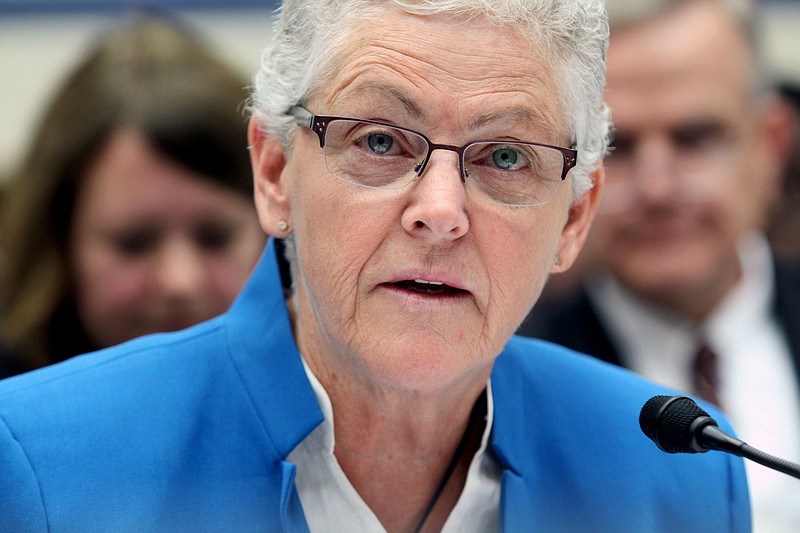WASHINGTON - Industry groups and states dependent on fossil fuels, including the attorneys general in Alabama and Georgia, began filing court challenges Friday to President Barack Obama's Clean Power Plan, which aims to reduce greenhouse gas emissions.
Opponents of the plan were expected to file a flurry of lawsuits at the U.S. Court of Appeals as the Environmental Protection Agency published its final version of the new regulations. All but two of the 24 states filing challenges are led by Republicans. They deride the plan as an "unlawful power grab by Washington bureaucrats" that will kill coal mining jobs and drive up electricity costs.
"The Clean Power Plan is one of the most far-reaching energy regulations in this nation's history," said West Virginia Attorney General Patrick Morrisey, among those leading the challenges. "I have a responsibility to protect the lives of millions of working families, the elderly and the poor, from such illegal and unconscionable federal government actions."
The Obama administration and environmental groups counter that the rules are needed to cut carbon emissions while curbing the worst impacts of climate change and sea-level rise. They also say the plan will spur new clean-energy jobs.
The new rules would require states to cut carbon emissions by 30 percent by 2030. Each state has a customized target and is responsible for drawing up an effective plan to meet its goal.
Tennessee will have to cut its emissions by 39 percent by 2030, but TVA is well on its way toward meeting the target with the addition of new natural gas power plants, a second reactor at the Watts Bar Nuclear Plant and plans to expand hydroelectric, solar and existing nuclear power plants over the next decade. During an announcement this week of the Watts Bar Unit 2 reactor getting an operating license, TVA President Bill Johnson said TVA already has cut carbon dioxide emissions by 32 percent from 2005 levels and is on pace to cut carbon emissions from 2005 levels by 40 percent by 2020. TVA shut down the Widows Creek Fossil Plant in Alabama last month and plans to shutter other coal units at its Colbert, Johnsonville, Paradise and Allen fossil plants.
Tennessee is not among the states initially challenging the new EPA rules, although U.S. Sen. Lamar Alexander, R-Tenn., a member of the Senate subcommittee on energy and water resources, has denounced the EPA rules.
"This is just one more example of the federal government expanding the big, wet blanket of burdensome regulations on our economy that put people out of work and make it harder to find a job," Alexander said earlier this year.
The EPA says it has authority to enact the plan under the Clean Air Act. At issue are dueling provisions added to the law by the House and Senate in 1990. The EPA's interpretation relies on the Senate language, but opponents argue that the House version should win out.
"We are confident we will again prevail against these challenges and will be able to work with states to successfully implement these first-ever national standards to limit carbon pollution, the largest source of carbon emissions in the United States," said EPA Administrator Gina McCarthy.
EPA already regulates other power-plant pollutants under a different section of the Clean Air Act, and the opponents claim the law prohibits "double regulation."
Morrisey said he will seek a stay barring the plan from taking effect while the court challenges proceed, a question that will likely be up to the Supreme Court.
"We expect polluters and their allies to throw everything they've got at the Clean Power Plan, and we expect them to fail," said Sierra Club Executive Director Michael Brune, among those defending the law. "The Clean Power Plan is based on a law passed by Congress, upheld by the Supreme Court, and demanded by the American people."
The states challenging the plan in court are Alabama, Arkansas, Arizona, Colorado, Florida, Georgia, Indiana, Kansas, Kentucky, Louisiana, Michigan, Missouri, Montana, Nebraska, New Jersey, North Carolina, Ohio, South Carolina, South Dakota, Texas, Utah, West Virginia, Wyoming and Wisconsin.
There is some political variation within the list. Governors in Colorado, Michigan and New Mexico will comply with the new EPA rules even as attorneys general from their states joined the lawsuit. In North Carolina, the state environmental agency controlled by the Republican governor joined the opposition after the Democratic attorney general declined.
Members of Congress from coal-mining states also said Friday they will introduce new legislation aimed at blocking the EPA from enforcing the plan.
On the other side, 15 states and the District of Columbia say they are backing the Obama administration and will begin working to comply with the new rules.
Under the Clean Air Act, certain challenges to agency rules skip the federal district court and go directly to the appeals court in Washington, D.C.
